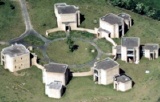2016-2017 Warwick EPSRC Symposium: School in Analysis and PDE
12-16 June 2017
Organisers: Antoine Choffrut (Warwick) and José Rodrigo (Warwick)
The Symposium will hold a week-long set of courses in Analysis and PDE. There will be 3 courses, given by Luigi Ambrosio (Pisa), Camillo de Lellis (Zurich) and Emanuele Spadaro (Leipzig).
Schedule
The final programme can be found here.
Funding
There is limited funding to support PhD Students and recent postdocs to attend the school. Please apply by May 1st to be elegible (all available funding has now been allocated).
Course I
Luigi Ambrosio - Scuola Normale Superiore di Pisa
TITLE: An introduction to the theory of flows of weakly differentiable fields, and applications
ABSTRACT: In my lectures I will ilustrate the basic ingredients of the theory of flows associated to nonsmooth vector fields, initiated by a paper by DiPerna-Lions in 1989 and formalized and extended to BV vector fields in a paper of mine in 2004. I will illustrate the basic duality principles which allow to transfer existence/uniqueness from the ODE to the PDE (transport/continuity equation). As an application, I will cover the case of Sobolev and BV vector fields, as well as some applications to PDE's (semi-geostrophic equations and, if time permits, the Vlasov-Poisson system).
NOTES: a set of relevant notes for the course can be downloaded here.
Course II
Camillo De Lellis - Universitaet Zurich
TITLE: Lectures on the Onsager's conjecture
ABSTRACT: In 1949 the famous physicist Lars Onsager made a quite striking statement about solutions of the incompressible Euler equations: if they are Hoelder continuous for an exponent larger than $\frac{1}{3}$, then they preserve the kinetic energy, whereas for exponents smaller than $\frac{1}{3}$ there are solutions which do not preserve the energy. The first part of the statement has been rigorously proved by Constantin, E and Titi in the nineties. In a series of works La'szlo' Sze'kelyhidi and myself have introduced ideas from differential geometry and differential inclusions to construct nonconservative solutions and started a program to attack the other portion of the conjecture. After a series of partial results, due to a few authors, Phil Isett has recently fully resolved the problem. In these lectures I will try to describe as many ideas as possible and will therefore touch upon the works of several mathematicians, including La'szlo', Phil, Tristan Buckmaster, Sergio Conti, Sara Daneri, Vlad Vicol and myself.
REFERENCES: Some relevant articles for the course include
1) The last paper of Laszlo and myself on the bulletin of the AMS:
http://www.math.uzh.ch/fileadmin/user/delellis/publikation/Nash_Bull_15.pdf
2) The C^0 paper on incompressible Euler:
http://www.math.uzh.ch/fileadmin/user/delellis/publikation/continuous_new12.pdf
3) The C^{0,1/3} paper with Tristan, Laszlo and Vlad:
http://www.math.uzh.ch/fileadmin/user/delellis/publikation/Onsager96.pdf
4) S. Conti, C. De Lellis, L. Székelyhidi Jr.
h-principle and rigidity for C^{1,\alpha} isometric embeddings
Nonlinear Partial Differential Equations
Abel Symposia Volume 7, 2012, pp 83-116
http://www.math.uzh.ch/fileadmin/user/delellis/publikation/iso60.pdf
5) C. De Lellis
The masterpieces of John Forbes Nash Jr.
To appear in H. Holden and R. Piene (editors): The Abel Prize 2013–2017. Springer Verlag.
http://www.math.uzh.ch/fileadmin/user/delellis/publikation/Nash_Abel_75.pdf
6) C. De Lellis, L. Székelyhidi Jr.
High dimensionality and h-principle in PDE
Bull. Amer. Math. Soc. (N.S.) 54 (2017), no. 2, 247–282.
http://www.math.uzh.ch/fileadmin/user/delellis/publikation/Nash_Bull_15.pdf
Course III
Emanuele Spadaro - Universitaet Leipzig
TITLE: The fractional obstacle problem
ABSTRACT: In this course the regularity of the fractional obstacle problem will be discussed. Fractional diffusions emerge in several models of applied science, such as quasi-geostrophic flows, American options' pricing, contact mechanics etc., and from the point of view of the theory of partial differential equations are prototypical for their non-local, non-linear character.
Surprisingly enough, despite the many achievements in free boundary problems and the recent increasing activity in the field, many important open questions remain open. The course will be focused on some of the recent regularity results, tentatively including the following list:
-- the connection with the lower dimensional obstacle problem via the Caffarelli--Silvestre extension lemma;
-- optimal regularity of the solutions;
-- the regularity of the part of the free boundary with smallest order of contact;
-- monotonicity formulas for free boundary points;
-- stratification of the singular points;
-- global rectifiable structure of the free boundary.
NOTES:
The first set of notes can be found here.
REFERENCES:
-- Silvestre, CPAM 07 http://onlinelibrary.wiley.com/doi/10.1002/cpa.20153/abstract based on Silvestre's thesis
-- Caffarelli, Salsa, & Silvestre, Invent. Math. 08 https://arxiv.org/abs/math/0702392
-- Garofalo, Petrosyan, Invent. Math 09 https://arxiv.org/abs/0804.2508
-- Focardi & Spadaro, Adv. Diff. Eq. 16 https://arxiv.org/abs/1502.07168
See also:
Mathematics Research Centre
Mathematical Interdisciplinary Research at Warwick (MIR@W)
Past Events
Past Symposia
Where possible, visitors should obtain an EDUROAM account from their own university to enable internet access whilst at Warwick.
You can register for any of the symposia or workshops online. To see which registrations are currently open and to submit a registration, please click hereLink opens in a new window.
Mathematics Research Centre
Zeeman Building
University of Warwick
Coventry CV4 7AL - UK
E-mail:
MRC@warwick.ac.uk

